Herman Van Rompuy The first permanent President of

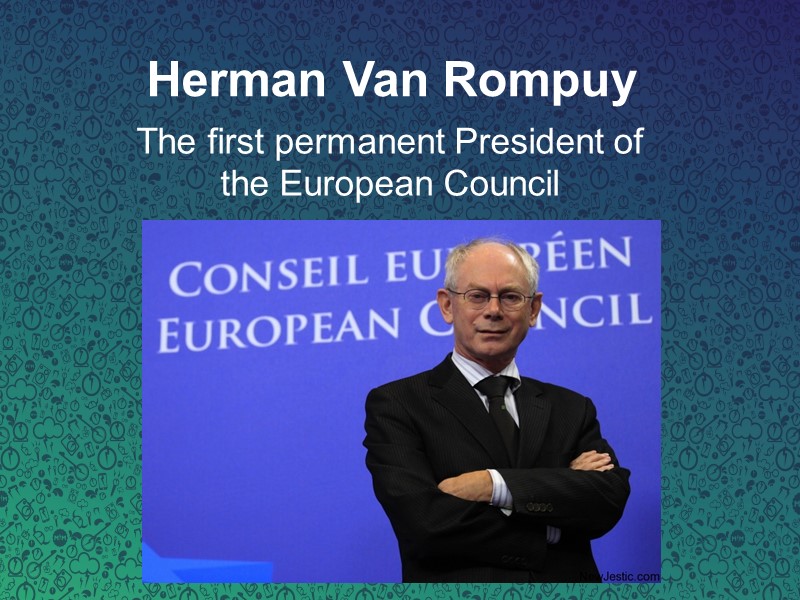
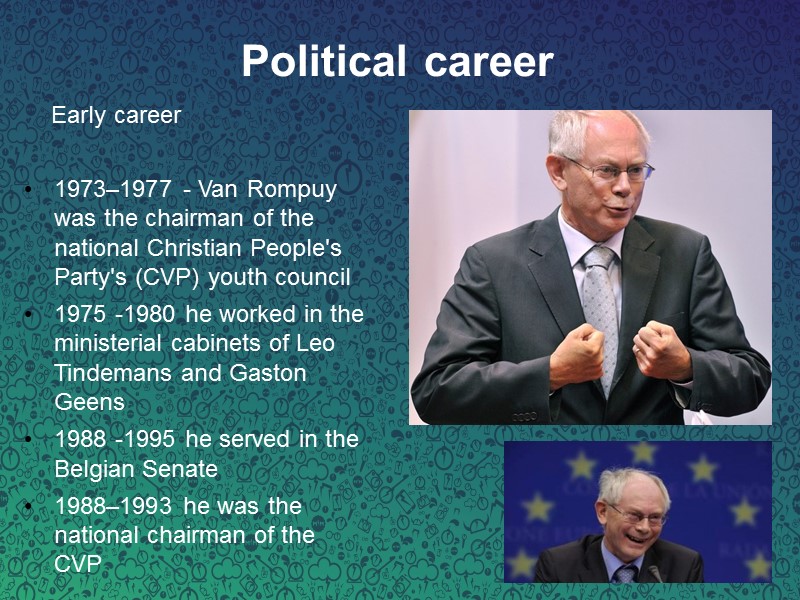
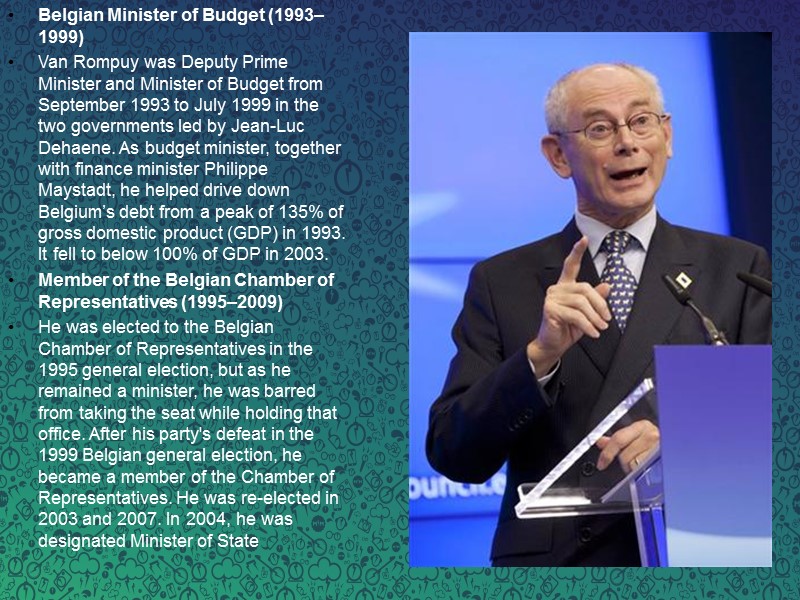
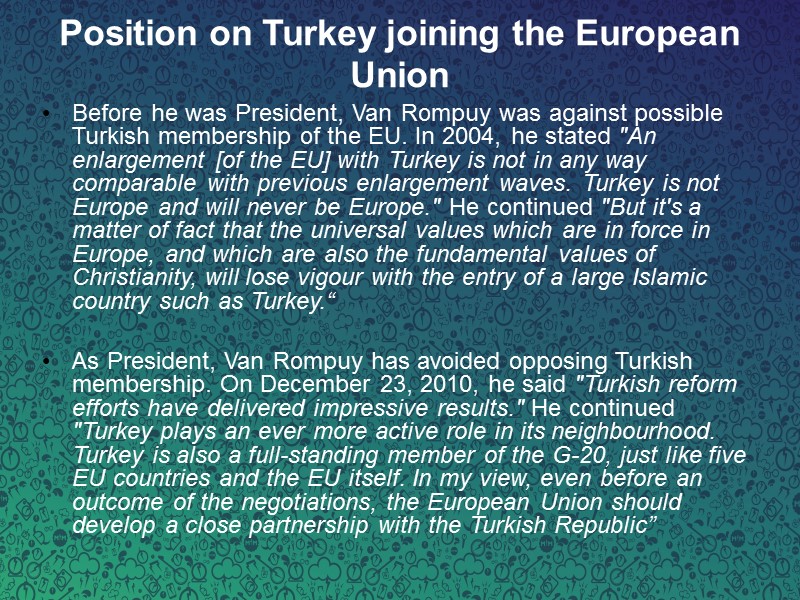
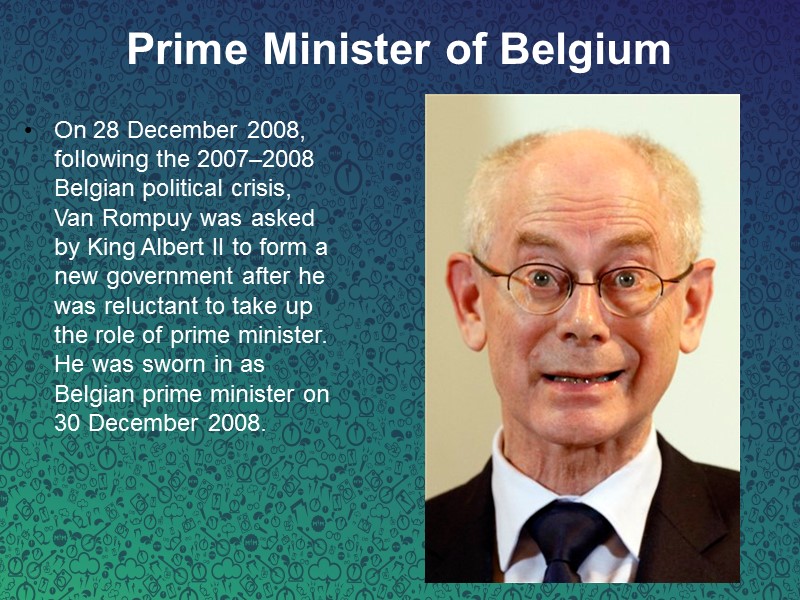
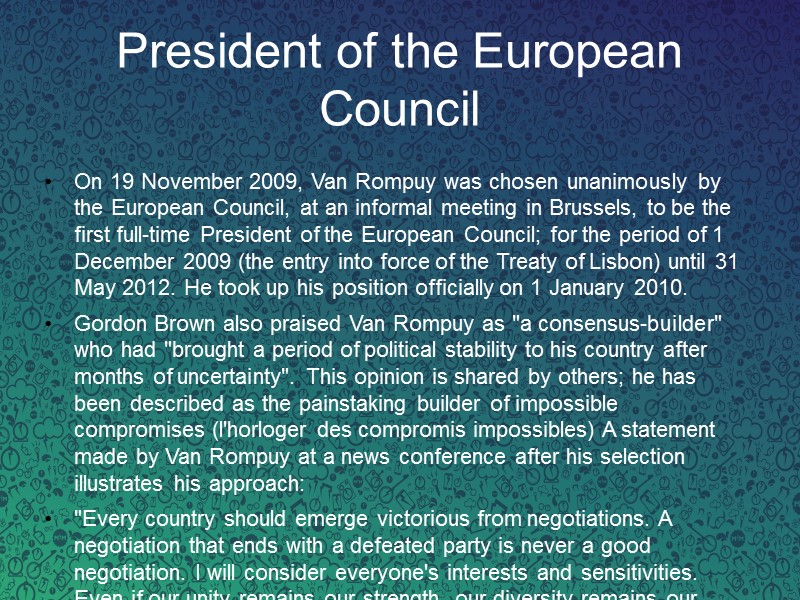
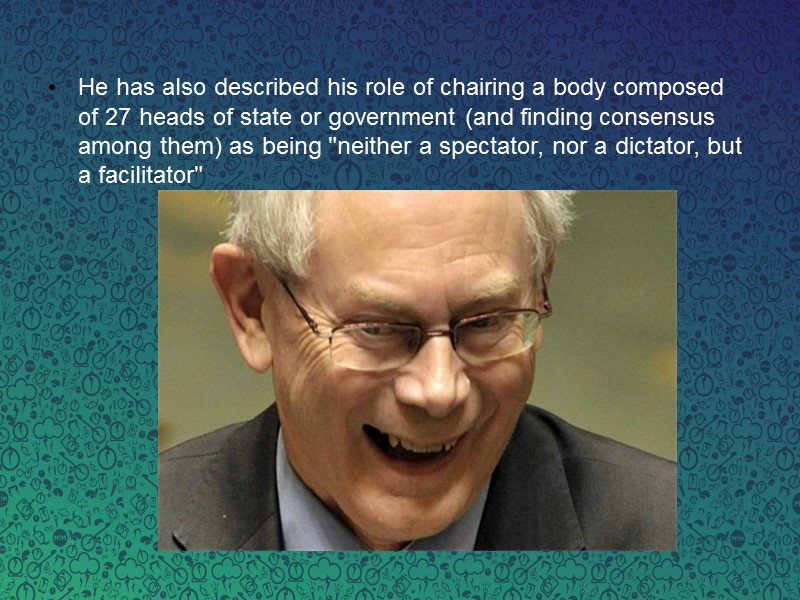
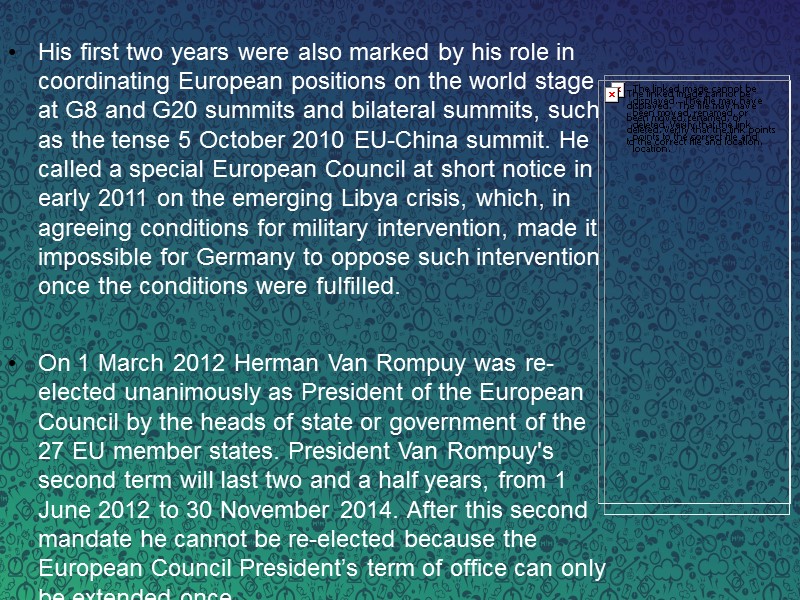
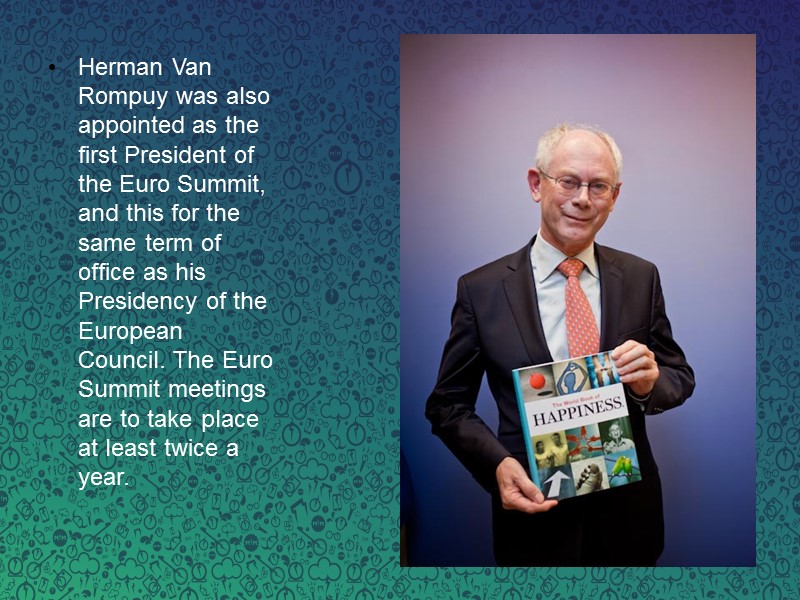
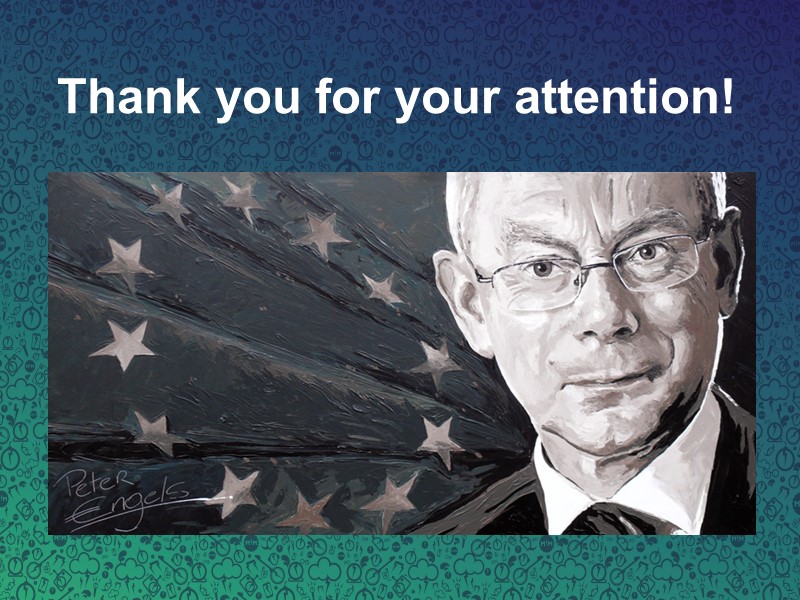
25486-herman_van_rompuy.ppt
- Количество слайдов: 10
 Herman Van Rompuy The first permanent President of the European Council
Herman Van Rompuy The first permanent President of the European Council
 Political career Early career 1973–1977 - Van Rompuy was the chairman of the national Christian People's Party's (CVP) youth council 1975 -1980 he worked in the ministerial cabinets of Leo Tindemans and Gaston Geens 1988 -1995 he served in the Belgian Senate 1988–1993 he was the national chairman of the CVP
Political career Early career 1973–1977 - Van Rompuy was the chairman of the national Christian People's Party's (CVP) youth council 1975 -1980 he worked in the ministerial cabinets of Leo Tindemans and Gaston Geens 1988 -1995 he served in the Belgian Senate 1988–1993 he was the national chairman of the CVP
 Belgian Minister of Budget (1993–1999) Van Rompuy was Deputy Prime Minister and Minister of Budget from September 1993 to July 1999 in the two governments led by Jean-Luc Dehaene. As budget minister, together with finance minister Philippe Maystadt, he helped drive down Belgium’s debt from a peak of 135% of gross domestic product (GDP) in 1993. It fell to below 100% of GDP in 2003. Member of the Belgian Chamber of Representatives (1995–2009) He was elected to the Belgian Chamber of Representatives in the 1995 general election, but as he remained a minister, he was barred from taking the seat while holding that office. After his party's defeat in the 1999 Belgian general election, he became a member of the Chamber of Representatives. He was re-elected in 2003 and 2007. In 2004, he was designated Minister of State
Belgian Minister of Budget (1993–1999) Van Rompuy was Deputy Prime Minister and Minister of Budget from September 1993 to July 1999 in the two governments led by Jean-Luc Dehaene. As budget minister, together with finance minister Philippe Maystadt, he helped drive down Belgium’s debt from a peak of 135% of gross domestic product (GDP) in 1993. It fell to below 100% of GDP in 2003. Member of the Belgian Chamber of Representatives (1995–2009) He was elected to the Belgian Chamber of Representatives in the 1995 general election, but as he remained a minister, he was barred from taking the seat while holding that office. After his party's defeat in the 1999 Belgian general election, he became a member of the Chamber of Representatives. He was re-elected in 2003 and 2007. In 2004, he was designated Minister of State
 Position on Turkey joining the European Union Before he was President, Van Rompuy was against possible Turkish membership of the EU. In 2004, he stated "An enlargement [of the EU] with Turkey is not in any way comparable with previous enlargement waves. Turkey is not Europe and will never be Europe." He continued "But it's a matter of fact that the universal values which are in force in Europe, and which are also the fundamental values of Christianity, will lose vigour with the entry of a large Islamic country such as Turkey.“ As President, Van Rompuy has avoided opposing Turkish membership. On December 23, 2010, he said "Turkish reform efforts have delivered impressive results." He continued "Turkey plays an ever more active role in its neighbourhood. Turkey is also a full-standing member of the G-20, just like five EU countries and the EU itself. In my view, even before an outcome of the negotiations, the European Union should develop a close partnership with the Turkish Republic”
Position on Turkey joining the European Union Before he was President, Van Rompuy was against possible Turkish membership of the EU. In 2004, he stated "An enlargement [of the EU] with Turkey is not in any way comparable with previous enlargement waves. Turkey is not Europe and will never be Europe." He continued "But it's a matter of fact that the universal values which are in force in Europe, and which are also the fundamental values of Christianity, will lose vigour with the entry of a large Islamic country such as Turkey.“ As President, Van Rompuy has avoided opposing Turkish membership. On December 23, 2010, he said "Turkish reform efforts have delivered impressive results." He continued "Turkey plays an ever more active role in its neighbourhood. Turkey is also a full-standing member of the G-20, just like five EU countries and the EU itself. In my view, even before an outcome of the negotiations, the European Union should develop a close partnership with the Turkish Republic”
 Prime Minister of Belgium On 28 December 2008, following the 2007–2008 Belgian political crisis, Van Rompuy was asked by King Albert II to form a new government after he was reluctant to take up the role of prime minister. He was sworn in as Belgian prime minister on 30 December 2008.
Prime Minister of Belgium On 28 December 2008, following the 2007–2008 Belgian political crisis, Van Rompuy was asked by King Albert II to form a new government after he was reluctant to take up the role of prime minister. He was sworn in as Belgian prime minister on 30 December 2008.
 President of the European Council On 19 November 2009, Van Rompuy was chosen unanimously by the European Council, at an informal meeting in Brussels, to be the first full-time President of the European Council; for the period of 1 December 2009 (the entry into force of the Treaty of Lisbon) until 31 May 2012. He took up his position officially on 1 January 2010. Gordon Brown also praised Van Rompuy as "a consensus-builder" who had "brought a period of political stability to his country after months of uncertainty". This opinion is shared by others; he has been described as the painstaking builder of impossible compromises (l'horloger des compromis impossibles) A statement made by Van Rompuy at a news conference after his selection illustrates his approach: "Every country should emerge victorious from negotiations. A negotiation that ends with a defeated party is never a good negotiation. I will consider everyone's interests and sensitivities. Even if our unity remains our strength, our diversity remains our wealth."
President of the European Council On 19 November 2009, Van Rompuy was chosen unanimously by the European Council, at an informal meeting in Brussels, to be the first full-time President of the European Council; for the period of 1 December 2009 (the entry into force of the Treaty of Lisbon) until 31 May 2012. He took up his position officially on 1 January 2010. Gordon Brown also praised Van Rompuy as "a consensus-builder" who had "brought a period of political stability to his country after months of uncertainty". This opinion is shared by others; he has been described as the painstaking builder of impossible compromises (l'horloger des compromis impossibles) A statement made by Van Rompuy at a news conference after his selection illustrates his approach: "Every country should emerge victorious from negotiations. A negotiation that ends with a defeated party is never a good negotiation. I will consider everyone's interests and sensitivities. Even if our unity remains our strength, our diversity remains our wealth."
 He has also described his role of chairing a body composed of 27 heads of state or government (and finding consensus among them) as being "neither a spectator, nor a dictator, but a facilitator"
He has also described his role of chairing a body composed of 27 heads of state or government (and finding consensus among them) as being "neither a spectator, nor a dictator, but a facilitator"
 His first two years were also marked by his role in coordinating European positions on the world stage at G8 and G20 summits and bilateral summits, such as the tense 5 October 2010 EU-China summit. He called a special European Council at short notice in early 2011 on the emerging Libya crisis, which, in agreeing conditions for military intervention, made it impossible for Germany to oppose such intervention once the conditions were fulfilled. On 1 March 2012 Herman Van Rompuy was re-elected unanimously as President of the European Council by the heads of state or government of the 27 EU member states. President Van Rompuy's second term will last two and a half years, from 1 June 2012 to 30 November 2014. After this second mandate he cannot be re-elected because the European Council President’s term of office can only be extended once.
His first two years were also marked by his role in coordinating European positions on the world stage at G8 and G20 summits and bilateral summits, such as the tense 5 October 2010 EU-China summit. He called a special European Council at short notice in early 2011 on the emerging Libya crisis, which, in agreeing conditions for military intervention, made it impossible for Germany to oppose such intervention once the conditions were fulfilled. On 1 March 2012 Herman Van Rompuy was re-elected unanimously as President of the European Council by the heads of state or government of the 27 EU member states. President Van Rompuy's second term will last two and a half years, from 1 June 2012 to 30 November 2014. After this second mandate he cannot be re-elected because the European Council President’s term of office can only be extended once.
 Herman Van Rompuy was also appointed as the first President of the Euro Summit, and this for the same term of office as his Presidency of the European Council. The Euro Summit meetings are to take place at least twice a year.
Herman Van Rompuy was also appointed as the first President of the Euro Summit, and this for the same term of office as his Presidency of the European Council. The Euro Summit meetings are to take place at least twice a year.
 Thank you for your attention!
Thank you for your attention!

